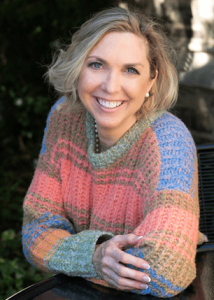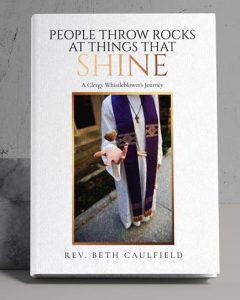Among Protestant denominations, The United Methodist Church admittedly has one of the most complicated, lengthy processes for ordaining its clergy. Now a clergywoman has written a “whistleblower” book claiming the UMC’s ordination process is rife with nepotism, cronyism, bullying and sexism.
In People Throw Rocks at Things That Shine: A Clergy Whistleblower’s Journey, Beth Caulfield says her path to becoming an “ordained elder in full connection,” the pinnacle of UMC ministry, was thwarted by those upholding a cruel, unjust system. The title is drawn from a French proverb that says people only throw rocks at trees bearing fruit. The actual wording is from a Taylor Swift song.

Beth Caulfield
Caulfield said she wrote the book “to be a blessing and an agent of change for those suffering in silence.”
Charges and denials
The book has drawn denials from the bishop and leaders in the Greater New Jersey Annual Conference where Caulfield served, and it has drawn endorsements from those outside the annual conference. Among those who have endorsed her book, Associates in Advocacy chair Rob Nelson comments: “This book reveals truth, a frustrating truth about a system needing repair. It should be required reading for all candidates for ministry.” Nelson’s organization offers volunteer counsel and support for ministers facing church trials.
Among the injustices Caulfield cites are:
- Nepotism, in which the bishop’s wife was hired for a special project and the bishop’s son, also a clergyman, serves churches in New Jersey.
- Patriarchy in the abuse of female clergy.
- Cronyism in appointments and conference business.
- Manipulation of laity and clergy by conference leaders.
- Ignoring United Methodist policy, from failing to consult clergy in advance about appointments to refusing to mandate basic sexual ethics training for clergy, among other infractions. (United Methodist pastors are appointed by a bishop, not called by a congregation, and are supposed to be consulted before being moved to a new appointment).
“A number of those injustices (cited in the book) are chargeable, but because of our system there’s more danger in filing a charge than sucking it up,” Caulfield said in an interview with United Methodist Insight, an online journal.
Steps to ordination
Caulfield began ministry as a layperson working for Community Bible Study International. After 10 years in human resource management, she discerned a call to ordained ministry and embarked on seminary. When she graduated from United Methodist-related Drew Theological School in Madison, N.J., she earned two prestigious honors: the Hoyt Hickman Award for Liturgical Excellence from the Order of Saint Luke and the Chalice Press Book Award for Outstanding Achievement.
Commissioned in 2013 as a provisional elder, the first step in ordination, Caulfield served six months in a church before being recruited to join the staff of Greater New Jersey Bishop John Schol. After her first interview for final ordination, Caulfield said she became aware that jealousy and resentment from others about her apparent success played roles in her rejection.
After her first interview for final ordination, Caulfield said she became aware that jealousy and resentment from others about her apparent success played roles in her rejection.
“The sermon I recorded for the Board of Ordained Ministry was one that received a standing ovation when I preached it at church,” Caulfield said in the Insight interview. “The sermon included a reference to the ‘Hunger Games’ series.”
That year when she went on a retreat with the ordained ministry board, she said, the leader of the interview team, who a few months later was named chairman, teased her that the event was the church’s “Hunger Games” to weed out candidates.
 The second time she was rejected for ordination, she said she believes the move came directly from Bishop Schol’s anger at her for supporting a close friend and clergy colleague brought up on charges of financial impropriety three weeks before the colleague was to be a candidate for bishop. The colleague was subsequently acquitted of all charges. In a chapter that reads like a spy novel, Caulfield recounts how she stealthily entered a hotel where her friend was staying during the jurisdictional meeting where bishops are elected so she could avoid being seen by conference leaders.
The second time she was rejected for ordination, she said she believes the move came directly from Bishop Schol’s anger at her for supporting a close friend and clergy colleague brought up on charges of financial impropriety three weeks before the colleague was to be a candidate for bishop. The colleague was subsequently acquitted of all charges. In a chapter that reads like a spy novel, Caulfield recounts how she stealthily entered a hotel where her friend was staying during the jurisdictional meeting where bishops are elected so she could avoid being seen by conference leaders.
“Cabinet members took charge of the second interview retreat regarding me,” Caulfield told Insight. “They bullied me and twisted my words to the point that Board of Ordained Ministry members were disturbed at their behavior, but they couldn’t say anything because it was too risky.”
Among Caulfield’s allegations disputed by Greater New Jersey Conference leaders is her account of a meeting between her and Bishop Schol. In the book Caulfield wrote that she felt so threatened by the bishop that when it was over, she vomited in the parking lot. Both Bishop Schol and his assistant, Nicola Mulligan, contend the meeting was a pastoral attempt to help Caulfield resolve problems in her ministry as an associate pastor leading a satellite campus of a large, traditionalist church.
Caulfield also asserts that her traditional theology incited the abuse she endured because Greater New Jersey leaders pushed same-sex marriage and ordaining LGBTQ clergy.
Caulfield also asserts that her traditional theology incited the abuse she endured because Greater New Jersey leaders pushed same-sex marriage and ordaining LGBTQ clergy in defiance of United Methodist policy. She serves as president of the Greater New Jersey chapter of the traditionalist Wesleyan Covenant Association, which has organized a new denomination, the Global Methodist Church, splitting off from the UMC. WCA members have been recruiting United Methodist churches to join the new denomination for several months.
“My book speaks for itself in terms of what I say and believe,” Caulfield said. “The instances I encountered are endemic to the entire denomination. They are a global concern.”
Rebuttal
In a rebuttal published on United Methodist Insight, Bishop Schol termed Caulfield “a gifted disciple of Jesus Christ” who “pushed hard to accomplish whatever task she was given.” The bishop said he hadn’t read Caulfield’s book but had seen excerpts she has sent to various conference leaders via email. He and other conference leaders dispute all of Caulfield’s claims, offering details about several of the episodes she describes.
“Regretfully, there are people vying for congregations and it is hurting the witness of The United Methodist Church.”
“I am, I have, and I continue to carry out The Book of Discipline,” Bishop Schol said in the article. “Over the last several years, and continued today, I have witnessed people in our nation portray untruthful statements, yet if they are said enough and gain media focus, those false statements take a life of their own.
“Regretfully, there are people vying for congregations and it is hurting the witness of The United Methodist Church, creating confusion and division. This line of tension can be seen as beneficial to those who want people to leave the church. In (Greater New Jersey), we honor all our congregations, and we recognize that there will be differences in theology and how people will be in ministry with and by LGBTQ persons. We want to keep the light on Christ, rather than seek to hurt one another.”
Cynthia B. Astle is a veteran journalist who has covered the worldwide United Methodist Church at all levels for more than 30 years. She serves as editor of United Methodist Insight, an online journal she founded in 2011.
Related articles:
United Methodist Church split draws celebration, lament and soul-searching
Just when you think the United Methodist Church breakup can’t get any more difficult …
Here’s what you need to know about why United Methodists now appear headed for a nasty divorce


